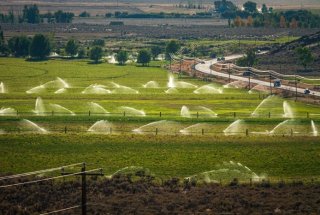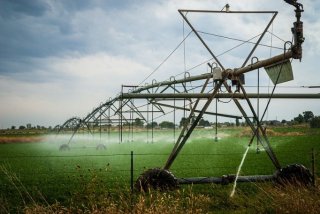Reusing Water for Agricultural Activities Resources
Agricultural water reuse is when water generated on the farm or from a local wastewater treatment plant is appropriately treated and applied to assist with the production of crops. Crops may include commercial or non-commercial food crops consumed by humans or livestock and non-food crops such as: pasture grass for milking and non-milking animals, fodder, fiber, and seed crops, vineyards, orchards, ornamental nursery stock, Christmas trees, and silviculture. States frequently have different treatment requirements for the reuse of water for food crops and non-food crops or ornamentals, such as Christmas trees.
On-farm agricultural reuse has the co-benefits of reducing off-farm water runoff of nutrient rich water, preventing negative impacts of nutrient pollution on sensitive water bodies, and providing nutrient rich water for crop propagation. Using recycled water for agricultural irrigation can help reduce costs associated with water importation, reduce freshwater demands, and create a reliable, sustainable, and local water supply.

Water reuse is the practice of reclaiming water from a variety of sources, treating it, and reusing it for beneficial purposes. The following resources relate to reuse for agricultural activities; for information on other uses, please visit the Water Reuse Resource Hub by End-Use.
On this page:
Key Resources
The following are a sampling of the key water sector resources that are freely available to support water practitioners interested in developing agricultural-related water reuse projects. Visit the Water Reuse Information Library for additional water reuse materials.
- 2025 Risk Based Framework for Developing Microbial Treatment Targets for Water Reuse – This EPA document provides detailed scientific information that states and Tribes can use to develop risk assessments and microbial treatment targets that support safe potable and non-potable water reuse. Watch a webinar that introduces the document here.
- Israel Water Reuse Virtual Tour Webinar Series (2021) – This water reuse virtual tour furthered a long-standing environmental knowledge-sharing partnership between the United States and Israel. The three-part series covered measures that enable Israel to recycle nearly 90 percent of its wastewater for agricultural use. Topics included Israel's water reuse regulatory approaches, technology, and agricultural irrigation applications with case studies featured throughout. The virtual tour was hosted by the Israeli Ministry of Environmental Protection, the Israeli Ministry of Economy and Industry, the Israel Water Authority, the Israeli Ministry of Agriculture and Rural Development, the Israeli Ministry of Health, WaterEdge, WateReuse Association, U.S. Department of Agriculture, U.S. Food and Drug Administration, and EPA.
- Advancing Water Reuse in Small and Disadvantaged Communities Webinar (2021) – EPA, U.S. Department of Agriculture-Rural Development, National Rural Water Association, and the American Water Works Association initiated efforts to aid small and economically disadvantaged communities in pursuing water recycling through this webinar. Attendees participated in facilitated breakout sessions to voice their interests, challenges, and needs for reuse project support. Facilitators sought feedback from participants about their interest in engaging in a pilot support project and urged them to share information about successful small community water recycling efforts.
- 2012 Guidelines for Water Reuse – This EPA document includes discussion of regional variations of water reuse in the U.S., advances in wastewater treatment technologies relevant to reuse, best practices for involving communities in planning projects, international water reuse practices, and factors that will allow expansion of safe and sustainable water reuse throughout the world. The guidelines also provide more than 100 case studies from around the world that highlight how reuse applications can and do work. Chapter 3.2 is specific to agricultural reuse.

State Water Reuse Regulations and Guidelines
The following states developed guidelines and regulations for reusing water for agricultural activities. Click the links from the REUSExplorer to review summary documents, which include the state regulations authorizing the use of recycled water for agricultural activities, water quality and treatment specifications, definitions, and more!
